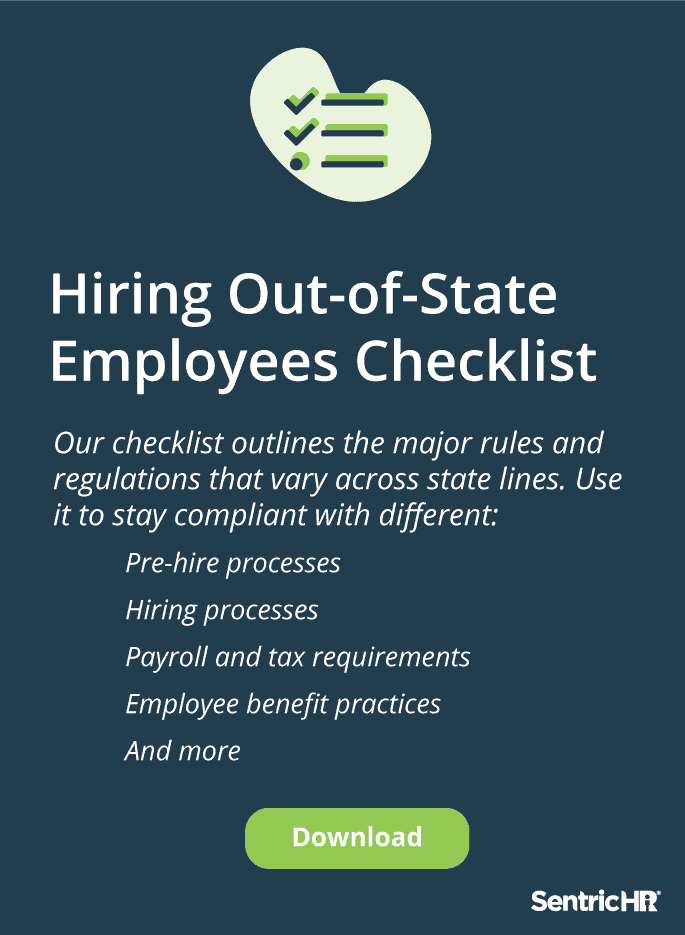Introduction
Hiring out-of-state employees can help you reach a wider talent pool and expand your business presence in another region. However, each state has its own rules and regulations governing the hiring process, payroll, taxes, and more. When you hire an out-of-state employee, you need to comply with that state’s requirements (which may be different from your home state’s). Because of this, operating in multiple states can quickly become complicated.
We created this guide to make the out-of-state hiring process as easy as possible. This guide outlines key legislative differences between states for:
- Taxes
- Payroll
- The hiring process
- Employee benefits
- And more
Whether you’re hiring an out-of-state employee for the first time or expanding your business somewhere new, this guide will help you stay compliant no matter where your employees are.
We also condensed the information in this guide into a handy checklist. Reference it any time you’re hiring across state lines.
Legal Disclaimer: The information contained in this guide is for general informational purposes only and is not a list of services that Sentric provides. Under no circumstance shall we have any liability to you for any loss or damage of any kind incurred as a result of the use of the template or reliance on any information provided in this template. Your use of the template and your reliance on any information is solely at your own risk.
Before You Begin: The Pre-Hire Process
Before you take any action in another state, you need to complete some foundational work.
Register or Qualify to Conduct Business
If you’re hiring employees outside your home state, you most likely need to register to do business in that state.
To register, you must obtain a Certificate of Authority (or a Foreign Qualification). This Certificate is the same whether your business is a corporation, limited liability company (LLC), or nonprofit.
Each state has a slightly different application process. However, you generally need the following information to complete the application:
- Your business name
- Business location
- Owner, management, or director name(s)
- Registered agent information
- Shares information (if your business is a corporation)
- Your Federal Employer Identification Number (FEIN)
Depending on the state, you may need to supply additional information with your application. One example is a Certificate of Good Standing, which shows that you are in good standing with your home state. For a list of forms and fees required by each state, click here. Always check the state’s website for the most up-to-date information.
Once you gather the required materials, submit your application to the proper agency. In most cases (but not always!), this is the Secretary of State.
If your application contains errors or missing information, you may need to reapply and pay the application fee again. If you don’t secure a Certificate of Authority, you may be fined or penalized. Consult your legal advisor to help you through the application process and ensure your information is accurate.
Hire a Registered Agent
If you don’t have a physical presence in the state where you’re hiring a new employee, you may need to work with a registered agent.
Many state agencies only send documents to physical addresses within the state. A registered agent receives this correspondence on behalf of your company. They’re crucial to making sure you receive important communications.
Acquire Local and State Licenses, Permits, & Certifications
Some states require additional business licenses, permits, and certifications. These requirements may vary at the city and county levels as well. Consider:
- Building or zoning permits
- If you’re constructing a new building, remodeling, or operating a business from your home, you may need a zoning or building permit. Local zoning regulations may also restrict what type of businesses are allowed to operate in an area.
- Doing Business As (DBA) registration
- If your business uses a trade or fictitious name, you may need to register a DBA at the state, county, and/or city levels.
- Health permits
- If your business handles food or comes into close contact with human bodies, you may need a permit from the local health department. Restaurants, pools, spas, and nail salons are types of businesses that may need health permits.
- Occupational licenses
- If your business operates within a specific field, you may need to obtain an occupational license. Professions that require these licenses include accountants, cosmetologists, contractors, real estate brokers, and more.
Check for Additional State and Local Requirements
A lot can change from state to state or city to city. Check your local or state government’s website for a full list of requirements.
Tax Requirements
Hiring an out-of-state employee creates new tax implications for your business. For one thing, you need to register with the appropriate agencies and acquire the necessary permits in each state. Different regions often require you to register with different agencies. Each state also sets their own tax rates and requirements.
This section outlines some of the key tax considerations relevant to multistate employers. For many of these items, we link to sites with additional guidance. Always check your local and state governments’ websites for the most up-to-date information. You can also work with a payroll and tax filing provider for additional assistance.
State Tax ID
You probably already have a Federal Tax ID or Employer Identification Number (EIN) to pay Federal taxes. Similarly, you may need a State Tax ID Number to pay state taxes for sales, withholding, and unemployment. It’s important to note that most states don’t have one account for all of these programs, so you may need to register separately for each one.
Whether you need a State Tax ID usually depends on state legislation surrounding income and employment taxes.
Sales Tax License
Also referred to as a sales tax registration or permit, a sales tax license ensures you stay compliant with state agencies by collecting and remitting sales tax on items your business sells.
You’re required to obtain a sales tax license if your business has a connection, or nexus, with a state. Each state defines these connections differently, so please check each state’s interpretation to determine whether you have a nexus there. You also need to account for any local requirements.
In general, your business should not collect sales tax if you haven’t registered with the local or state agencies to do so. It’s also important to note that Alaska, Delaware, Montana, New Hampshire, and Oregon do not impose a state sales tax. They may have local requirements, though.
Income Tax Withholding
In general, you’re required to withhold income tax in the state(s) where your employees work. So, if you hire an out-of-state employee, you withhold their state’s taxes (not your home state’s). As an example, let’s say your home state is Pennsylvania and you hire a remote employee in New York. Because that employee is working in New York, you withhold New York taxes, even though your business is based in Pennsylvania.
Some states (usually neighboring states) have reciprocal agreements with each other. In a reciprocal agreement, both states agree to only withhold income tax for the state where the employee lives (not where they work).
Regulations vary widely depending on the state. Some states require you to withhold income in your home state and the state where your employee works. Some states don’t withhold any income tax. Some states don’t tax on employment income but do tax other forms of income (like stock dividends). Other states have additional considerations for remote employees.
Unemployment Tax
In addition to Federal unemployment taxes, each state (including the District of Columbia) has a separate unemployment tax program. These programs may impact the employer-paid and/or employee-paid portions of the tax. Examples of these programs include State Unemployment Tax Act (SUTA), State Unemployment Insurance (SUI), and reemployment tax.
Registration, rates, and requirements differ by state. Of note on the employee-paid side of unemployment tax, Alaska, New Jersey, and Pennsylvania require you to deduct unemployment tax from employee paychecks.
Workers’ Compensation
State-run workers’ compensation taxes are mandatory in all states except Texas. Again, each state has different rates, requirements, and coverage. Contact the state’s workers’ compensation office for details.
Other Tax Considerations
The tax requirements mentioned earlier have definite differences between states. Other tax-related considerations you may need to watch out for include:
- Bond repayments
- Disability insurance
- Paid Family & Medical Leave (some states treat this as a tax)
- Local taxation requirements
The Hiring Process
Once you’ve done all of the background work, it’s time to actually hire an out-of-state employee.
At this point, it should come as no surprise that different states have different rules regarding the hiring process. This section describes some of those differences to help you stay compliant.
As always, state and local governments’ websites will have the most up-to-date information.
Applications
Your job applications must be compliant with Federal, state, and local legislation. If you’re hiring employees in a different state, you may need to reevaluate your applications to ensure they’re compliant with the following items.
Nondiscrimination or Equal Employment Opportunity (EEO) Regulations
In addition to Federal regulations, the following protections may vary on the state and/or local levels:
- Marital status
- Sexual identity
- Gender identity or expression
- Whistle-blowing
- Off-duty conduct (like smoking)
Ban the Box and Fair Hiring Legislation
Several states and municipalities have passed laws that prohibit you from asking about a candidate’s criminal history before extending a conditional job offer.
Background Checks, References, & Drug Tests
Each state has various laws regarding background investigations, reference checks, and drug tests. These laws often dictate:
- which positions need to be tested
- when you’re allowed to request screening
- who must pay for the tests
Additional Considerations
Some additional considerations to keep in mind for applications include:
- Providing the necessary legal disclosures
- Asking about Social Security Numbers, emergency contact information, and access to transportation
- Obtaining credit reports
General Hiring
In addition to application-specific requirements, individual states have regulations regarding:
- Child labor laws
- Immigration and employment verification
- Use of E-Verify for Form I-9
- Interview question restrictions
- Use of lie detectors
- Use of public records pertaining to applicant
- Retaining records
- New hire reporting requirements
Forms
Some states also require forms and/or documentation as part of the hiring process for:
- Disabilities
- Health insurance
- Sexual harassment
- Workers’ compensation
- And others
Payroll
Wage and hour laws vary widely from state to state and city to city. These laws affect your payroll, so you should be familiar with them. If you use a payroll processing system, you should also make sure it can accommodate these regional differences. Major payroll considerations include:
Minimum Wage
The Federal minimum wage is set at $7.25/hour. Each state can set their own minimum wage rate, which may be less than, equal to, or greater than the Federal rate. The higher wage rate is the one you need to comply with. If there is no state minimum wage, the Federal wage rate applies.
For a look at each state’s minimum wage, please click here.
Pay Frequency
Each state can dictate how often you pay your employees. Most states require you to pay your employees at least monthly, semimonthly, biweekly, or weekly.
Others have more specific requirements. In Maine, for example, employers must pay their employees at least once every 16 days.
No matter which state you’re in, the state mandate (if there is one) represents the minimum requirement. You’re allowed to pay employees more frequently than they require. Some states, such as Pennsylvania, allow you to set the frequency.
Some states do not have any mandate regarding pay frequency. As of 2021, these states include Alabama, Florida, and South Carolina.
For a look at each state’s mandated pay frequency, please click here.
Pay Stubs
Whether you need to give your employees pay stubs is dependent on state legislation. There is no Federal requirement.
Some states mirror the Federal stance and do not require you to provide pay stubs to your employees. Some states require you to provide pay stubs but allow you to choose between paper and electronic ones. Still others specifically require that electronic stubs be easily accessible and/or printable.
Your employees also have rights specific to pay stubs. In some states, you must have an employee’s permission to change the way you deliver their pay stubs. If they prefer one method, you need to comply with their wishes. In other states, you have to provide a paper stub unless an employee chooses to receive stubs electronically.
The information included on the pay stub also varies by state and industry.
For more information on pay stub requirements, please click here.
Overtime
Some states base overtime on the number of hours an employee works in a week. Others base it on the number of hours an employee works in a single work day. Each state may also have their own overtime wage rate requirements.
If a state doesn’t have overtime rules, you must follow the Federal rules. When rules conflict, you always comply with the one that is most beneficial to your employees.
Fair Scheduling
Often referred to as Fair Workweek or Predictive Scheduling, fair scheduling laws aim to create more ethical scheduling practices. The details differ by state and locality, but these laws often require employers to give employees advance notice of schedules. They may also require “predictability pay” for employees whenever an employer makes late schedule changes. Other regulations may include, for example, prohibiting employers from scheduling an employee for back-to-back closing and opening shifts.
These laws are becoming more widespread, so be sure to check state and local legislation for any related requirements. For more information about fair scheduling laws, please click here.
Deductions from Wages
States may permit and/or prohibit employer deductions from employee wages for things such as:
- Cash shortages
- Medical or physical examinations
- Drug tests
- Damage or loss to employer property
- Required uniforms, clothing, or tools
- Other items necessary for employment
In general, you may deduct permissible items from an employee’s wages so long as doing so does not cause their pay rate to fall below minimum wage. However, there may be exceptions to this depending on state regulations.
Some states also require you to send a notice to employees before deducting anything from their wages. For more information about wage deductions by state, please click here.
Meal Periods and Breaks
Under Federal law, you do not need to provide lunch or rest breaks to your employees. However, states may impose their own break regulations. Each state may require employers to provide:
- Lunch breaks or meal periods
- Rest and recovery breaks
- Nursing mother breaks
States may also set rules dictating employee eligibility, break duration, and compensation. Your business may be subject to industry-specific requirements as well.
If a state does not have rules regarding meal periods and breaks but you choose to provide these rest periods anyway, you must comply with certain Federal requirements, including the Fair Labor Standards Act (FLSA).
For more information about meal and break periods by state, please click here and here.
Final Pay
When an employee is terminated or quits of their own volition, you’re required to give them their final pay. Depending on the state, you may also need to give them any unused vacation pay. Different states require you to give employees their final paycheck by different deadlines.
In California, for example, you must give a terminated employee their final paycheck immediately. If an employee quits, you must give them their final paycheck within 72 hours or immediately (if they gave you at least 72 hours notice). In Pennsylvania, on the other hand, you must give employees their final paycheck by the next scheduled payday, regardless of whether they quit or were terminated.
For a full list of states and their final pay requirements, please click here.
Sick Pay
Multiple states and localities have their own sick pay requirements. These regulations may vary from one location to the next based on employer and employee coverage, accrual rates, and the conditions in which employees can use this leave.
To stay compliant, consult your state and local legislation for the most up-to-date information.
Leave Regulations
Leave requirements also vary by state. There are too many types of leave to go into specifics for each one here, but keep requirements for the following in mind:
- Vacation
- Sick
- Holiday
- Jury duty
- Voting
- Bereavement
- Family and Medical
- You’re required to provide leave under the Federally-mandated Family and Medical Leave Act (FMLA) if there is no state leave law with more generous provisions.
- Disability
Workers’ Compensation
Most states set their own workers’ compensation requirements. Coverage requirements are typically based on business size and/or industry. Coverage rates and the injuries that fall under workers’ compensation laws also vary.
For a breakdown of regulations by state, please click here.
Disability Insurance
California, Hawaii, New Jersey, New York, Rhode Island, and Puerto Rico mandate short-term disability insurance. However, they each have their own regulations regarding how the insurance is funded and which employees are covered.
If you operate in any of these locations, check their specific disability requirements to ensure you stay compliant.
Direct Deposits
Under Federal law, you may require your employees to receive their wages via direct deposit. However, some states do not allow you to mandate direct deposit. Each state may also have regulations regarding:
- Direct deposit fees
- The bank or financial institution the employee accesses
- Employee ability to opt out of direct deposit
- Use of direct deposit in certain industries or business sectors
Contact your state’s department of labor for the best information.
Unclaimed Wages and Property
You must report unclaimed wages and property to the proper state entities. Different states require you to report to different departments. Procedures and deadlines for reporting unclaimed property may also vary by state.
Click here to see each state’s details.
Tip Pooling
Under Federal law, you can tip pool so long as:
- You notify employees of your tip pooling policy,
- Your employees make at least minimum wage between wages and tips, and
- Owners, managers, and employers do not participate in the tip pool.
Some states have their own regulations in addition to the Federal requirements. For example, Alaska, California, Hawaii, Minnesota, Montana, Nevada, Oregon, and Washington require you to pay employees the full state minimum wage before factoring in tip pool earnings. In other words, you can’t take advantage of the tip credit in these states.
Click here for more information about maximum tip credit amounts by state.
Employee Benefits
Employee Benefits Plans
No Federal laws require you to offer group healthcare benefits to your employees. However, if you do offer these benefits, your plans may limit coverage to in-state employees.
Check with your carrier to ensure out-of-state employees are covered under your plan. If they aren’t, you may want to look for a new plan with comparable prices and offerings.
Benefits Brokers
If you offer voluntary benefits, such as disability or cancer insurance, your benefits broker needs to be licensed in each state where you have employees enrolling in these benefits. For standard benefits, like health, dental, and vision, your broker only needs to be licensed in your home state.
In either case, your broker should be familiar with the benefits and regulations in each state where your employees are working.
Other Considerations
In addition to everything already mentioned, other rules and regulations may vary by state and locality. The following list outlines common areas of difference between states. It’s not comprehensive, but if you’re hiring an employee in another state you should check legislation regarding:
Employee Communication
You may be required to share certain information with your employees regarding your workplace policies and their rights as employees. This may include:
- Workplace posters and notices
- Notices of termination
- Employee handbooks
Remote Employees
If you’re hiring remote workers in another state, there may be additional steps you need to take, such as:
- Taxing remote employees
- Obtaining Home Occupation Permits
Data Security
There may be specific regulations and restrictions detailing:
- Biometric time clocks and the data collected from them
- Personal information protection
- Personnel file access
Reporting
Reporting requirements and guidelines often differ by state for:
Training
You and your employees may be required to undergo various trainings for things such as:
- Workplace harassment
- Health and safety
- Industry or job-specific duties
Workplace Conditions & Accommodations
State laws may set specific considerations for the workplace, including but not limited to:
- Marijuana use
- Accommodations for nursing mothers
- Concealed carry
COVID-19
Many COVID-19-related restrictions are set at the state level. Check your local and state guidance to stay compliant.
Employee Engagement and Other Operational Considerations
Running a multistate business can introduce challenges that aren’t strictly compliance-related. With a workforce spread out across the country, how can you continue to build a strong company culture and drive engagement?
If you’re hiring your first out-of-state employee, ask yourself the following questions:
- Do you need a physical office in another state or will employees work remotely? If you need a physical office, how much will it cost?
- If employees will work remotely, how will you engage with them and make them feel like part of the team?
- Do you currently have the HR power you need to tackle all of the processes and compliance that come with a multistate business?
- How will you communicate effectively across state lines? How will you navigate different time zones?
How Sentric Can Help
Bringing any new employee on board can be an involved process. When you hire an out-of-state employee, the process can get even more complicated.
But don’t let that stop you. Whether becoming a multistate employer is an unavoidable part of your business or the expansion you’ve been wanting for years, growth is often worth the challenges that come with it – and we’re here to help you through them.
Our all-in-one HRIS helps you manage your people no matter where they are. SentricHR helps you track and onboard new hires, capture time, process payroll, deliver benefits, and more. As a full-service payroll and tax provider, our licensed experts are also on hand to help with any questions and guide you through the process.
We condensed the information in this guide into a handy checklist for you to use anytime you’re hiring across state lines. Download the Hiring Out-of-State Employees Checklist now!
While this guide covers most of the differences you may encounter in other states, it certainly isn’t all-inclusive. Remember to check with your state and local entities for the most up-to-date and accurate information.
Other Helpful Tools
Please see below for other helpful resources:









